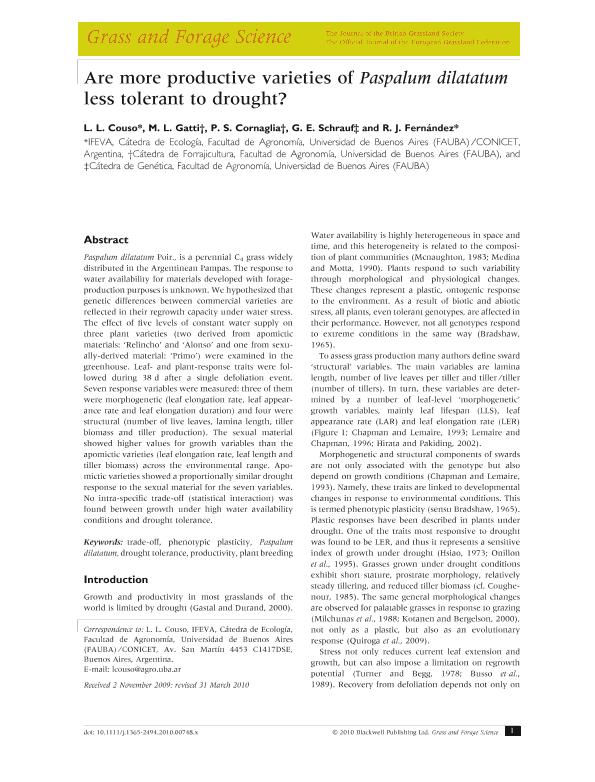Artículo
Are more productive varieties of Paspalum dilatatum less tolerant to drought?
Couso, Luciana Laura ; Gatti, María Laura; Cornaglia, Patricia Susana; Schrauf, Gustavo Enrique; Fernandez Alduncin, Roberto Javier
; Gatti, María Laura; Cornaglia, Patricia Susana; Schrauf, Gustavo Enrique; Fernandez Alduncin, Roberto Javier
 ; Gatti, María Laura; Cornaglia, Patricia Susana; Schrauf, Gustavo Enrique; Fernandez Alduncin, Roberto Javier
; Gatti, María Laura; Cornaglia, Patricia Susana; Schrauf, Gustavo Enrique; Fernandez Alduncin, Roberto Javier
Fecha de publicación:
09/2010
Editorial:
Wiley Blackwell Publishing, Inc
Revista:
Grass and Forage Science
ISSN:
0142-5242
Idioma:
Inglés
Tipo de recurso:
Artículo publicado
Clasificación temática:
Resumen
Paspalum dilatatum Poir., is a perennial C4 grass widely distributed in the Argentinean Pampas. The response to water availability for materials developed with forage-production purposes is unknown. We hypothesized that genetic differences between commercial varieties are reflected in their regrowth capacity under water stress. The effect of five levels of constant water supply on three plant varieties (two derived from apomictic materials: 'Relincho' and 'Alonso' and one from sexually-derived material: 'Primo') were examined in the greenhouse. Leaf- and plant-response traits were followed during 38 d after a single defoliation event. Seven response variables were measured: three of them were morphogenetic (leaf elongation rate, leaf appearance rate and leaf elongation duration) and four were structural (number of live leaves, lamina length, tiller biomass and tiller production). The sexual material showed higher values for growth variables than the apomictic varieties (leaf elongation rate, leaf length and tiller biomass) across the environmental range. Apomictic varieties showed a proportionally similar drought response to the sexual material for the seven variables. No intra-specific trade-off (statistical interaction) was found between growth under high water availability conditions and drought tolerance.
Archivos asociados
Licencia
Identificadores
Colecciones
Articulos(IFEVA)
Articulos de INST.D/INV.FISIOLOGICAS Y ECO.VINCULADAS A L/AGRIC
Articulos de INST.D/INV.FISIOLOGICAS Y ECO.VINCULADAS A L/AGRIC
Citación
Couso, Luciana Laura; Gatti, María Laura; Cornaglia, Patricia Susana; Schrauf, Gustavo Enrique; Fernandez Alduncin, Roberto Javier; Are more productive varieties of Paspalum dilatatum less tolerant to drought?; Wiley Blackwell Publishing, Inc; Grass and Forage Science; 65; 3; 9-2010; 296-303
Compartir
Altmétricas



